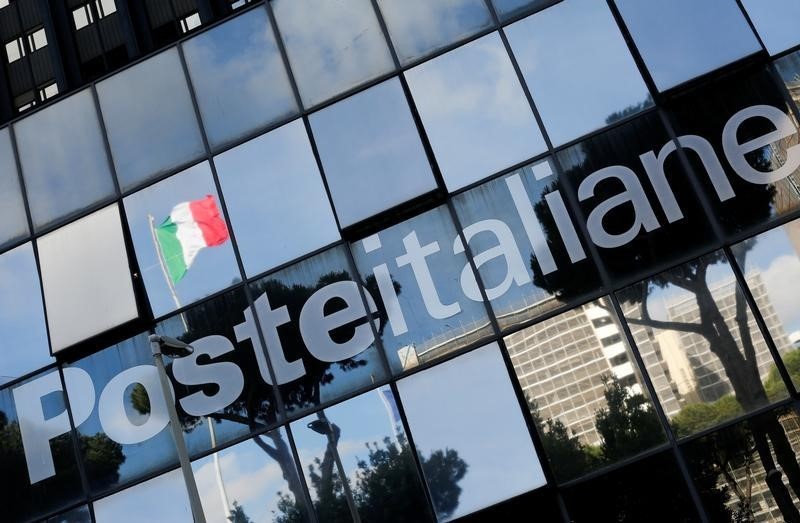By Francesca Landini and Maria Pia Quaglia
MILAN (Reuters) - Italians worried about the stability of their banks have found a new place to put their money: the state-controlled post office.
"Nobody knows where your money is safe today," says Leonardo Galli, a 58-year-old accountant who has resolved to move all his savings out of his bank to a current account with Poste Italiane (MI:PST), one of many who are deserting the banking sector.
"Poste Italiane is state controlled, this is a safeguard," he explains. He already channels his salary into a Poste Italiane account and pays his bills through a standing order made at a post office branch a few steps away from his office.
The 154-year-old Poste Italiane is winning deposits as fast as some traditional lenders are losing them, attracting savers disillusioned with a banking system that is straining under bad debts and appears to be in permanent crisis.
Alarmed by daily media reports about faltering bank rescue plans, savers have deposited about 3 billion euros ($3.4 billion) in the post office in the last six months alone.
Poste, owned 65 percent by the state and with a network of 13,000 branches, reported a 6.5 percent jump in deposits in the first half of this year. They continued to grow in the third quarter, a source at Poste Italiane said.
It is unclear how much of this money has been taken from the banking sector, but troubled lenders such as Monte dei Paschi di Siena (MI:BMPS) and Banca Carige (MI:CRGI) leaked deposits at a similar rate, around 6 percent, in the same period.
For Galli, from the northern town of Como, Poste's yellow-and-blue logo represents security and stability but it has other advantages he could not find at his bank. In opening an account two years ago, he was attracted by Poste's extensive network, low costs and offices that opened on Saturday mornings.
He was also pleased with the return on some investments he made recently through Poste.
"I have invested money in a fund and I earned a yield my bank couldn't match," Galli said. He did not want to reveal the name of the lender, but said it was one of Italy's major banks.
A HAVEN OR A RISK?
What many of Poste Italiane's savers do not know is that the post office does not have a banking license, even though it takes deposits and offers loans under the brand-name BancoPosta.
And, in the event of a full-blown financial crisis, it may not be the financial haven that some savers believe it to be.
BancoPosta does not subscribe to Italy's voluntary fund to insure deposits, which guarantees savers for up to 100,000 euros deposited into bank accounts. To protect its depositors, it says it has ring-fenced capital equal to 1 billion euros and an extra buffer of 400 million euros kept with the state treasury.
Under a presidential decree, BancoPosta can take deposits provided they are invested in eurozone sovereign bonds, but the post office's deposit-taking arm has chosen to invest almost entirely in Italian debt, at roughly 40 billion euros.
In total, Poste Italiane has more than 60 percent of its assets tied up in Italian government debt, including another nearly 80 billion euros held under the group's insurance arm.
By contrast, Italy's best-capitalized major bank, Intesa Sanpaolo (MI:ISP), invests 12.8 percent of its assets in Italian state debt, including bonds held by its insurance arm.
Some analysts say Poste Italiane's large exposure to the state could increase if the group's bid to buy an Italian fund manager, Pioneer Investments, is successful.
Pioneer, currently held by Italy's largest lender UniCredit (MI:CRDI), has a sizeable exposure to Italian debt being one the country's biggest asset managers. Pioneer does not disclose its exact holdings of state debt.
"Poste is not a bank but it is exposed to the sovereign so ... who exactly is holding the bag in the worst-case scenario?" asks economist Francesco Galietti, chief executive of Policy Sonar, a political risk consultancy based in Rome.
Galietti questions the stability of Poste Italiane in the event of a sovereign debt crisis, a scenario where Italian bonds plunge, imperiling the group's balance sheet.
Many savers, though, worry more about the risk of a bank failure than a sovereign financial crisis.
Last November, Italians watched as retail shareholders and bondholders in four small, troubled banks were forced to suffer losses under the terms of a government-orchestrated rescue. The terms were designed to anticipate "bail-in" rules that were due to be imposed by the European Union a few weeks later.
Thousands of clients lost savings of a lifetime, including a pensioner who hanged himself in desperation last December.
BancoPosta, a non-bank financial institution, is not subject the bail-in rules, which are designed to ensure investors share the cost of a bank rescue along with taxpayers.
"Poste Italiane has greatly benefited from the enforcing of the bail-in rules this year, and the crisis of four small banks last year in Italy," said Gian Luca Ferrari (NYSE:RACE), insurance and asset management analyst at Mediobanca Securities.
The European Commission declined to comment when asked about the impact of its bail-in rules on Italian bank deposits.
BancoPosta is the only major European state-controlled post office to take deposits and make loans without a banking license, analysts said. France's state-controlled post office, La Poste, has a financial arm with a banking license that is regulated by the European Central Bank, while Germany's Postbank is now part of Deutsche Bank (DE:DBKGn).

($1 = 0.8928 euros)